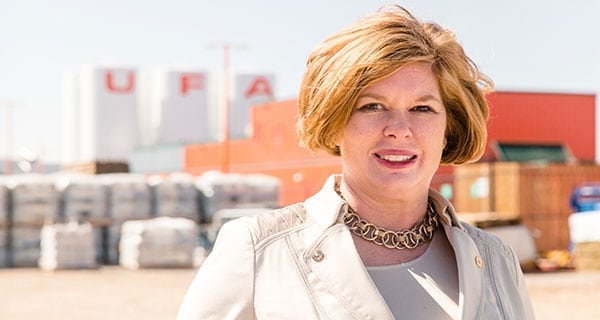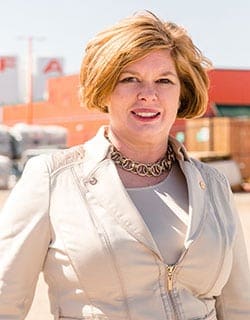Carol Kitchen is president and CEO of UFA.
Calgary’s Business: What’s the United Farmers of Alberta and what does it do?
Kitchen: United Farmers of Alberta (UFA) is a member-owned co-operative. We’re a progressive and diversified business that provides the products, services and solutions our owners and customers in rural communities need to successfully run their operations.
We operate the largest cardlock network in Alberta with 106 locations, as well as three locations in Saskatchewan and two in British Columbia. We also have 35 Farm & Ranch Supply stores and Ag Depot locations across the province.
Our largest segment is the sale and distribution of diesel fuel sold to commercial customers, oilfield businesses and farmers.
Our member-owners guide our decision-making and are rooted in the heart of all we do.
CB: What’s your vision and mission for the organization currently and moving forward?
Kitchen: As a co-operative, our vision and mission are centred on serving our member-owners by providing them with competitive products and trusted advice that they need to operate successful businesses.
Our mission is to ensure that our members have what they need, when they need it; we provide fuel, seed, chemicals, fertilizer and farm supplies at competitive prices, and in turn we share our earnings with our owners in the form of a patronage dividend.
We also support the rural communities where our members live and work through community investment.
Over the past 15 years, UFA had ventured into non-core businesses in an attempt to diversify; however, in the past four years and moving forward, our work has been and will continue to be refocusing on our core businesses of petroleum and agribusiness. Today’s farms are becoming larger and more specialized in their operations and with a changing demographic. We need to ensure we have the right assets and value proposition in place to serve a diverse customer base.
We also have a social responsibility to support our members and producers as it pertains to industry-related matters like farm safety, environmental issues and crop input regulations. We will continue to invest in community building initiatives through partnerships like the ones we have with Ag for Life, 4-H Alberta and the Calgary Stampede.
CB: How has the organization changed over the years?
Kitchen: In the late 1800s and early 1900s, pioneers put down their roots in rural Alberta. Families began to cultivate and care for the land. In 1909, local farmers came together in the spirit of co-operation and formed the United Farmers of Alberta under the UFA Act. At that time, the government established an official purpose for UFA. That purpose, which still holds true today, is to “support the economic and social well-being of farmers across rural Alberta.”
As people settled into Alberta, UFA focused on organizing farmers to work together in response to economic issues like access to markets and local issues like access to health care. On April 13, 1918, Bill 9, an Act to Incorporate the United Farmers of Alberta, received Royal assent. This bill allowed UFA members the opportunity to pool orders and buy in larger volumes.
Not long after that, UFA organized even further, forming the government of Alberta from 1921 to 1935. We left provincial politics after securing the mineral rights for Alberta – a cornerstone of the province’s long-term prosperity.
In 1953, the board and management noted that horses were leaving the farm and combustion engines were taking their place with fuel becoming an increasingly important agricultural input. UFA made the strategic move to acquire Maple Leaf Fuels, proving to be a visionary move that provided the bulk of our co-operative’s future earnings. Since then, UFA has ridden the wave of growth of the oil and gas industry in Western Canada with the expansion of our fuel network.
Along the way, we’ve supported farmers by aggregating their needs and leveraging the collective to secure better products, services and market access in all parts of our business.
Even though 100 years have passed, the co-operative business model is as relevant to our business and our members today as it was then.
CB: What are the biggest challenges and concerns of farmers in Alberta today?
Kitchen: Co-operatives were formed across North America in the early 1900s so that farmers in rural areas could compete with large conglomerates primarily in the east. Individual farmers on their own could not influence rail service or the prices that they were made to pay for seed or chemicals. Co-operatives, including UFA, were established to aggregate the voice and buying power of farmers in the face of much bigger suppliers and market-makers.
In some ways, the same issues still exist today. Rarely does an individual producer have the scale to negotiate with global suppliers like Shell, Bayer, Nutrien and CP Rail. Through a co-operative business model, like UFA, we’re able to leverage the power of a collective to secure better prices and services for our members.
UFA can invest in bigger assets to be shared across our membership so that individual farmers aren’t tying up precious capital to handle fertilizer or fuel in larger volumes. In turn, we share our earnings with our members in proportion to the business they do with us.
At the same time, we are also able to advocate for farmers in the face of changing regulations and outside influences on their livestock or crop businesses.
CB: What do you see in the future for the organization and for its role?
Kitchen: Just like every industry today, our customers have many new and expanding offers to choose from in order to support their businesses and we need to be competitive and current with products, services and innovative ways to serve customers.
For over 100 years, we’ve been part of the fabric of rural Alberta and our province plays an important role in feeding people around the world, providing petroleum products, and in giving back to the communities where we live and work. I am very optimistic about our ability to continue to serve rural Alberta farms and businesses now and into the future.
– Mario Toneguzzi
The views, opinions and positions expressed by columnists and contributors are the author’s alone. They do not inherently or expressly reflect the views, opinions and/or positions of our publication.



